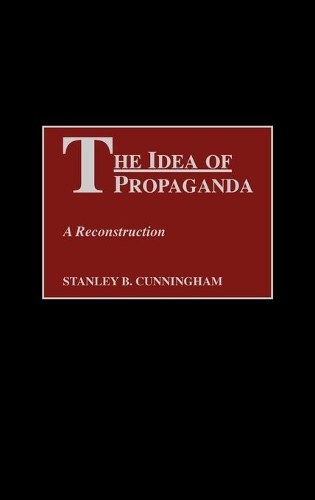
The Idea of Propaganda: A Reconstruction
(Hardback)
Publishing Details
The Idea of Propaganda: A Reconstruction
By (Author) Stanley B. Cunningham
Bloomsbury Publishing PLC
Praeger Publishers Inc
30th May 2002
United States
Classifications
Tertiary Education
Non Fiction
Ethics and moral philosophy
303.375
Physical Properties
Hardback
248
Width 156mm, Height 235mm
510g
Description
To understand properly the use of propaganda, it is necessary to move beyond the conventional, largely descriptive treatments that have been the scholarly norm, and to move deeply into a sustained theoretical analysis of the concept in terms of its primary cognitive and ethical deficits. Through a sequential consideration of the epistemology, ethics, and metaphysics of propaganda--that is, one that emerges from a historical review of theories and definitions of the subject--author Stanley B. Cunningham provides a radical new window on a much-discussed discipline. He aims to secure a concept of propaganda that reflects the complexity and sophistication of contemporary mass persuasion practices, while avoiding the trivializations and cliches that mark much of propaganda scholarship. Utilizing an assortment of philosophical analyses and arguments, Cunningham contends that the culture of propaganda is primarily and originally rooted in a wide range of epistemological disservices--that, indeed, propaganda is neither ethically neutral nor indeterminate, and that its lack of ethics composes its very definition. Eschewing the methodology of social science, this radical study represents the first-ever systematic and philosophically structured approach in the 80-year history of propaganda analysis.
Reviews
.,."a comprehensive theoretical inquiry into the manipulation of symbols in order to achieve mass persuasion....This impressive piece of scholarship should prove useful to any reader with a serious interest in the subject. Upper-division undergraduates through faculty and professionals."-Choice
...a comprehensive theoretical inquiry into the manipulation of symbols in order to achieve mass persuasion....This impressive piece of scholarship should prove useful to any reader with a serious interest in the subject. Upper-division undergraduates through faculty and professionals.-Choice
[b]reathes desperately needed life into an oxygen starved concept, freeing propaganda from its long isolation within communication theory and releasing it into the wide-open air of philosophical inquiry....Cunningham contributes significantly to propaganda analysis by identifying challenges to the concept's utility and analyzing approaches that have missed the mark. More important, he provides a ground-breaking, eleven-point reconsituation of propaganda, summarizing how and why it inverts the higher epistemic order. In doing both of these things, he succeeds using precisely the kind of virtuous intellectual conduct he claims propagandists reject. Keeping "truth" as his goal, his result is far from being simply more propaganda about propaganda; it is discourse clearly the service of greater knowledge, reflection and real understanding.-Journalism and Mass Communication Quarterly
"breathes desperately needed life into an oxygen starved concept, freeing propaganda from its long isolation within communication theory and releasing it into the wide-open air of philosophical inquiry....Cunningham contributes significantly to propaganda analysis by identifying challenges to the concept's utility and analyzing approaches that have missed the mark. More important, he provides a ground-breaking, eleven-point reconsituation of propaganda, summarizing how and why it inverts the higher epistemic order. In doing both of these things, he succeeds using precisely the kind of virtuous intellectual conduct he claims propagandists reject. Keeping "truth" as his goal, his result is far from being simply more propaganda about propaganda; it is discourse clearly the service of greater knowledge, reflection and real understanding."-Journalism and Mass Communication Quarterly
..."a comprehensive theoretical inquiry into the manipulation of symbols in order to achieve mass persuasion....This impressive piece of scholarship should prove useful to any reader with a serious interest in the subject. Upper-division undergraduates through faculty and professionals."-Choice
"[b]reathes desperately needed life into an oxygen starved concept, freeing propaganda from its long isolation within communication theory and releasing it into the wide-open air of philosophical inquiry....Cunningham contributes significantly to propaganda analysis by identifying challenges to the concept's utility and analyzing approaches that have missed the mark. More important, he provides a ground-breaking, eleven-point reconsituation of propaganda, summarizing how and why it inverts the higher epistemic order. In doing both of these things, he succeeds using precisely the kind of virtuous intellectual conduct he claims propagandists reject. Keeping "truth" as his goal, his result is far from being simply more propaganda about propaganda; it is discourse clearly the service of greater knowledge, reflection and real understanding."-Journalism and Mass Communication Quarterly
Author Bio
STANLEY B. CUNNINGHAM is Professor Emeritus at the University of Windsor in Ontario, Canada. He is the co-author and co-editor of Television Advertising in Canadian Elections: The Attack Mode, (1993).
